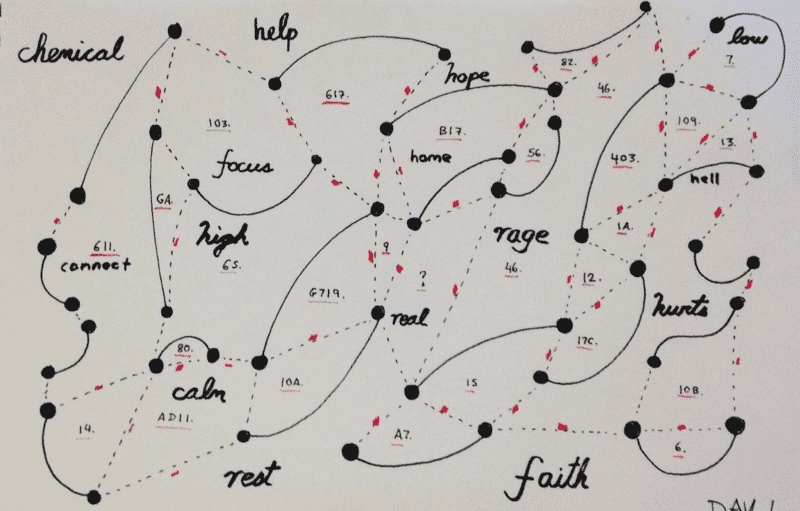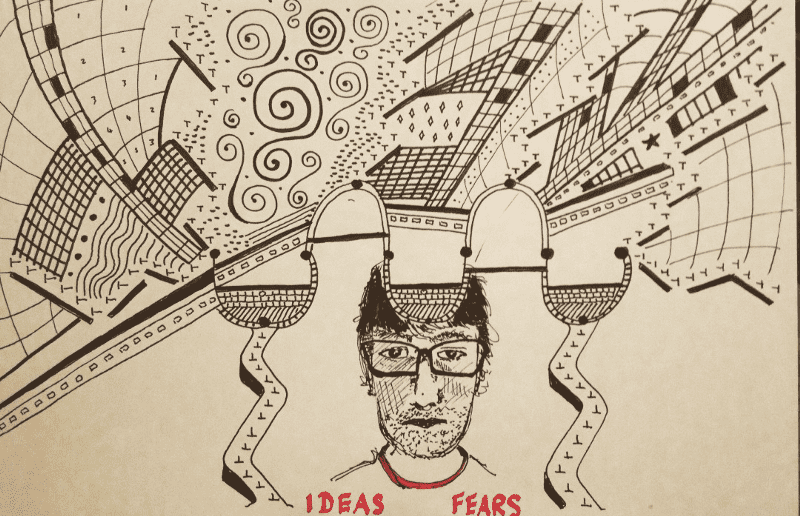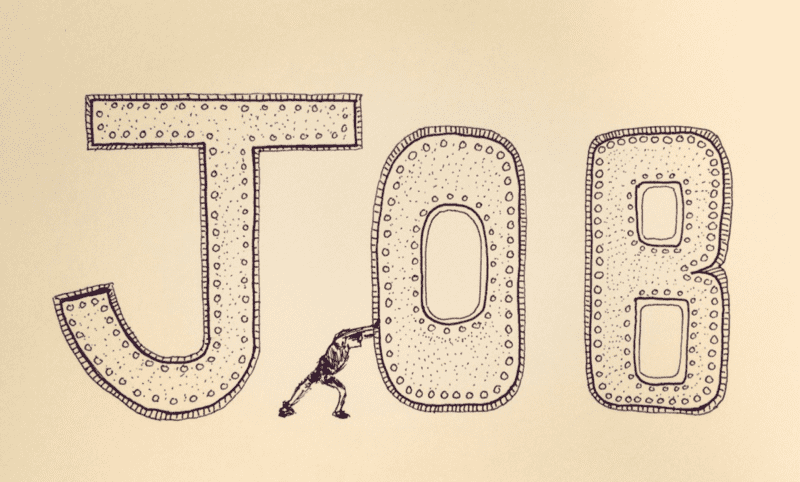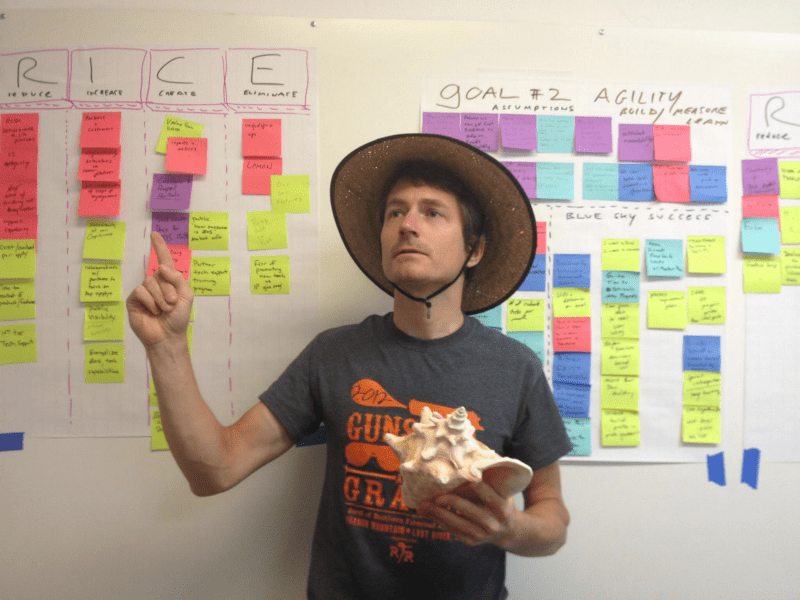Note: This post isn’t my normal tech/product fare, although it does relate to work. It talks about growing up with addiction, and later that transferring to work situations. I’ll be back to tech/product in the next post. Hang tight.
At age eight, I wrote working agreements for my family. I wanted the fighting (and drinking) to stop. My contract — written in loopy cursive, dull pencil, and red ink underline — is packed away somewhere in a Neiman Marcus Christmas sweater box near the mothballs. Every couple years, I’ll stumble across it while looking for the happy-looking photos, of which there are plenty. These situations aren’t binary and clearcut. Wonderfully loving people can do self-destructive things. And things can, and do, improve.
As a certain brand of adult child, you hold a core belief — fantasy, almost — that if everyone can just get on the same page you’ll be OK.
 There’s hypervigilance and overthinking. At work, you pick up on shifts in the flow of energy, the turning tide, the disappointed coworker, the elephant in the room, and the snarl of politics. You develop a keen sense of “the system”, and tend not to blame individuals (because individuals are good, of course, but do bad things)
There’s hypervigilance and overthinking. At work, you pick up on shifts in the flow of energy, the turning tide, the disappointed coworker, the elephant in the room, and the snarl of politics. You develop a keen sense of “the system”, and tend not to blame individuals (because individuals are good, of course, but do bad things)
. You need, on some level, a battle to fight, or — as a teacher once told me — a wolf behind every tree. Perhaps this is why adult children often gravitate to the helping professions.
Overthinking Things. Adult children start thinking ‘too early’ because they are not able to proceed in early life by ‘going-on-being’ Often they are precocious intellectually and this leads to intellectual attainment that is valuable as an adult. However there is a tendency to misuse cognition to try to sort out matters of emotion or preference (source)

These traits are rewarded and prove to be valuable in some contexts, but also come at a deep cost. Work environments can be particularly challenging.
We are in our element when there is tension, a nut to crack, and a system to unravel. “If only _________ could see how much this is impacting others!” “Why can’t other people see what I see?” “I have to cover all of the angles!” “This all flows down from THAT dysfunction!” I remember putting small bits of tape (and later pen marks) on wine bottles hoping that I could “prove” that something was wrong, and then everything would be better.
Ironically, what can appear as externally focused — helping others, fighting for others, bringing peace, empowering people— is itself an act of self-preservation. “Fixing” feels safe, but you get so focused on fixing, that you don’t notice the progress you’re making, or whether you actually feel good!
Excessive Altruism This is often vicarious nurturing. The adult child does for others what he or she down deep wants to receive. It usually leads, however, to self-impoverishment (which puts a de facto ceiling on how much others really could be helped anyway) (source)Cognitive dissonance and coherence issues appear in almost all companies. There’s almost always some baggage there…just like any family. I don’t think “all companies are fucked up”, but I think they’re always working through some sort of challenge (hopefully with some degree of psychological safety).
 At the water cooler you’ll find coworkers who look and sound frustrated. And they are at that moment. But you have to remember that they aren’t internalizing the information like you may be internalizing the information. They’re likely playing a longer game…a game you find difficult to play because you’re not used to sustained happy endings. They expect healthy outcomes. If it gets to be too much, they’ll hit healthy limits and leave. They’re not bringing home the angst. So as much as you might want to help and champion the cause (deep down, your cause)
At the water cooler you’ll find coworkers who look and sound frustrated. And they are at that moment. But you have to remember that they aren’t internalizing the information like you may be internalizing the information. They’re likely playing a longer game…a game you find difficult to play because you’re not used to sustained happy endings. They expect healthy outcomes. If it gets to be too much, they’ll hit healthy limits and leave. They’re not bringing home the angst. So as much as you might want to help and champion the cause (deep down, your cause)
…you have to remember your core needs.
The same goes with leaders and managers. Trust me, I’ve been that guy writing the “shit is fucked up, we need to fix it” email to bosses and CEOs. In many cases I’ve been rewarded for that — the guy who calls it like it is, and doesn’t sugar coat. One even said:
I like having you around because you challenge things. You’re the only person willing to challenge me. You make me think. But how are you? Are you happy?Bless that guy. Smooth as silk, while the castle was burning!
The personal toll can be large. Burnout and workaholism are a real threat.
 I’m not an expert in this (obviously). I’m talking about my experiences, which may not be like your experiences. I just wanted to share a bit and encourage others to share. Doing so has helped me. I’ve benefited from support groups, reading, meditation, and the support of my family and significant other. I’ve come to grips with the fact that some of this “legacy code” is pretty damn effective for certain tasks. And that occasionally I need to do some refactoring. Gotta get some product dev in there :)
I’m not an expert in this (obviously). I’m talking about my experiences, which may not be like your experiences. I just wanted to share a bit and encourage others to share. Doing so has helped me. I’ve benefited from support groups, reading, meditation, and the support of my family and significant other. I’ve come to grips with the fact that some of this “legacy code” is pretty damn effective for certain tasks. And that occasionally I need to do some refactoring. Gotta get some product dev in there :)
So, excuse the cliche, but know there are other people out there who might share your experiences. To truly help others, we need to help and protect ourselves.
Back to our original programming on the next post. These drawings are from my 100 Doodle project.
